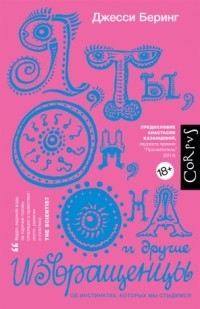Больше рецензий
7 ноября 2022 г. 23:13
162
5 Rule of life number 34: if it exists, someone has a fetish for it.
РецензияTrigger Warning: everything. (That’s a joke, but as a certified snowflake I have to inform you that the book mentions and/or discusses in details: sexual assault, (self-)mutilation, cannibalism, necrophilia, paedophilia, zoophilia, murder, violence, conversion therapy, unnecessarily detailed descriptions of the worst cases of STDs.)
That’s a surprisingly good book, so let’s get its positive sides out of the way so that I can complain about details for however many words this ends up being. If someone recommends this book to you as a “sex education”-related one, proceed with caution, because, while I would say that some themes discussed here are integral to one’s sex education, that’s not exactly what you’d expect (and not what I expected when it was put on the same list is “Come As You Are” and “Becoming Cliterate”). This is not a manual on pleasure or partner communication – this book describes the evolution of cultural and medicinal approach to different aspects of human sexuality and the modern scientific – biological, psychological, psychiatrical, evolutional (the most interesting one!) – view of them. The important themes I mentioned is that people should only be judged upon their actions and the actual harm they bring to others and not their thoughts or desires (in other words – thought crime isn’t real and being uncomfortable with some information doesn’t mean being hurt).
It’s very thorough in both the historical examples and the proper research references. The author has a surprisingly good sense of humour – when going into a sex-related non-fiction book I usually brace myself in expectancy of awkward puns and while these are also here in abundance, quite a few actually land well. The above-mentioned historical examples together with anecdotal ones help the book remain engaging and not become a retelling of quarries over the contents of ICD and DSM. The author tries and mostly succeeds in staying fairly neutral while talking about things that cause a pretty visceral reaction at first.
The biggest complaint I have of is that I’m a little unhappy with stresses and focuses of the book. The best example I can give here is the part about transgender people – here is the place where you reasonably ask me “Wait, why are trans-folks here specifically, if it’s a book about sexuality?” to which I will answer you – because the author decided to give light to autogenyphilia nonsense and it didn’t sound exactly as a historical anecdote to me* – when you introduce something pseudo-scientific in your book, I presume it’s your author’s duty to debunk it. To his credit – he doesn’t say definitively that it’s a real thing and that even if it is and it is someone’s reason to transition, it doesn’t hurt anyone and is no one’s business. All in all, I think that someone should have spent less time on consensual cannibalism and a little more on his fellow queer people – after all, there are many more trans-women in the world than there are cannibals and that’s wonderful.
In general, it feels like sometimes the shock value and morbid curiosity overshadow the important messages. It’s not prevalent, but it’s there.
Also, can authors, please, already learn to use singular “they”? Are you being paid per symbol or what’s your problem?
*Additionally, he does explicitly say that nymphomania is an inherently misogynistic concept, but fails to mention that AGP is inherently trans-misogynistic.

